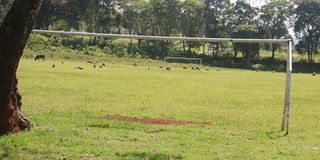Vandals, goats take over stadiums in Nyeri

Livestock grazing at Kinunga stadium in Nyeri on May 18, 2020. PHOTO | JOSEPH KANYI |
What you need to know:
- However, at Ihururu Stadium, the few athletes who train here have to put up with marauding livestock. Nothing much has been done at the stadium since the national government pledged to upgrade it concurrently with the Ruring’u Stadium.
- “If only they can keep their word and upgrade this stadium, it is the best for high altitude training. There is not much distraction and the air here is serene,” says 5,000 metres runner Jackson Maina.
The impasse brought about by the coronavirus pandemic has relegated stadiums in Nyeri County to drinking dens, havens for vandals and a herdsman’s paradise.
The unprecedented situation has left youths with lean choices for recreation, compounded by the government’s ban on public gatherings.
Efforts by the Nyeri County Government to upgrade and fence the sporting fields in the villages for the last two years have been greeted by wanton vandalism.
Not only that, local farmers have found “free and secure” grazing areas for their livestock.
A week ago, Nation Sport tiptoed into the Gichira Stadium in Tetu Constituency, and the wide open gate signalled an unpleasant situation.
The nuance of the green metal gate was conspicuous but its padlock had been hammered down.
Inside the pitch, one would easily think that there was a livestock market as goats and sheep freely grazed all over the field.

A vandalized socket inside the ablution block at Kinunga stadium in Nyeri county on May 18, 2020. PHOTO | JOSEPH KANYI | NATION MEDIA GROUP
A group of youths sat under the shade of an indigenous tree by the perimeter wall.
Here, the county government had just completed securing the facility by erecting a perimeter wall at a cost of Sh5.2 million with an aim of boosting football and volleyball games.
The only pit latrine at the stadium stands at the western side. It has no roof or doors. Someone probably carted them away to finish some village shed.
Aguthi-Gaaki Ward representative Stanley Wakibia pointed out that Covid-19 scuttled normal routine and activities for youth.
“It is important to remember that the stadiums were built for the purposes of recreation for the youth. Without sports, many have fallen into all manners of antisocial behaviours,” pointed out Wakibia.
The MCA said unless the communities took up the initiative of safeguarding the local stadiums, there is little the government could do to ensure the facilities were well maintained and properly used.
“These are public facilities built with hefty public funds, and the communities should guard them jealously because they are the biggest beneficiaries either directly or indirectly,” the MCA added.
At the Kinunga Community Stadium, the situation is even worse.
Even before the new ablution block is opened for the public, the toilet systems, a switch box and doors have been destroyed.

A vandalized socket inside the ablution block at Kinunga stadium in Nyeri county on May 18, 2020. PHOTO | JOSEPH KANYI | NATION MEDIA GROUP
Before the outbreak of Covid-19, this stadium was home to many tournaments featuring local clubs and schools due to its friendly location and high spectator turnout.
Hence the county government’s decision to allocate Sh5.6million for chain-link fencing and an ablution block at a cost of Sh1.6 million.
During the day, the local residents use the newly fenced stadium as a grazing field and at night, they turn the ablution block into a goat shed.
Samuel Mwihuri, a local trader at Kinunga Trading Centre, reads malice in the destruction.
Mwihuri listed over 10 schools, including Ihwa and Kihatha secondary schools and Outspan Medical College as major beneficiaries of the facility which has a public basketball court, the first public one in the county.
It may be of interest that Kinunga Stadium is Nyeri Marafiki FC’s home ground.
Julia Wanjiku, a club official, wants police to investigate the destruction and bring to book those behind the damages.
“Stadiums are constructed using public money and, therefore, the public should be in the frontline of safeguarding these resources.
“Those perpetrating the acts of destruction are enemies of development they should be arrested and charged,” said Wanjiku.
“One of the solutions to this menace is to employ a caretaker from the local community and engage them through the local leaders in a bid to make them own the stadium which is of their own benefit,” he said.
At Karatina Stadium, the Nyeri County Government has managed to contain the situation since it locked up all the gates after completing the perimeter fence at a cost of Sh10.8million.
However, at Ihururu Stadium, the few athletes who train here have to put up with marauding livestock. Nothing much has been done at the stadium since the national government pledged to upgrade it concurrently with the Ruring’u Stadium.
“If only they can keep their word and upgrade this stadium, it is the best for high altitude training. There is not much distraction and the air here is serene,” says 5,000 metres runner Jackson Maina.





